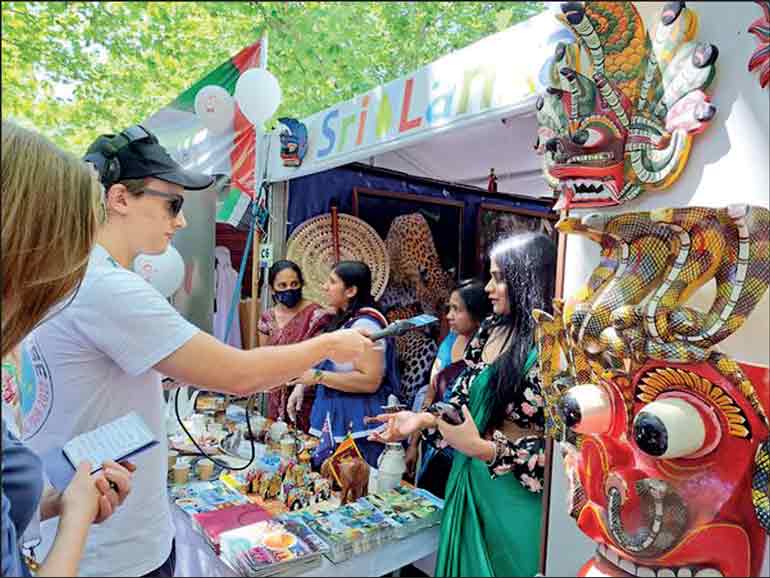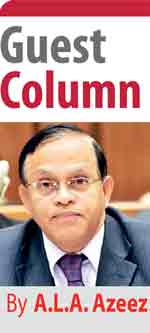Thursday Feb 19, 2026
Thursday Feb 19, 2026
Wednesday, 21 February 2024 00:20 - - {{hitsCtrl.values.hits}}

Promoting national culture abroad
 During my visit to Australia recently I took a keen interest to engage with several young persons of Sri Lankan origin in different cities. They were among the second and third generation youth from Sri Lanka’s migrant community resident Down Under.
During my visit to Australia recently I took a keen interest to engage with several young persons of Sri Lankan origin in different cities. They were among the second and third generation youth from Sri Lanka’s migrant community resident Down Under.
The idea of engaging with the youth came in the backdrop of “Sri Lanka Fest” – an expatriate cultural event that took place at the Federation Square in Melbourne on 25 November 2023.
A good many people of Sri Lankan origin and others were thronging the venue at the time I entered. There were several food stalls selling Sri Lankan varieties. A stall run by the Consulate of Sri Lanka in Melbourne exhibited some Sri Lankan items, but ‘Appe Kade’ appeared to be the attraction and the big earner (two plain hoppers, one egg hopper and lunu miris at AUD 20).
The event was really good from the point of view of promoting the various facets of culture, but what was particularly conspicuous was there being ‘no show’ by the Tamil community in Victoria. Throughout the program, public announcements and speeches were heard in the Sinhala language with an interlude of brief remarks by some guests, in English.
Lack of rapport between communities
Why is there still a defiant lack of rapport between the diaspora communities of Sri Lanka? Not just in Australia alone. Who can, and who should take the first step in creating such rapport and understanding?
Is it the role of the Government back home, specifically that of the Foreign Affairs Ministry and its diplomatic missions? Or, is it a function of the newly established Office for Overseas Sri Lankan Affairs (OOSLA)? Or, is it the responsibility of the leaders and individuals of all the communities of Sri Lankan origin living abroad?
A much larger policy issue remains open as well. That is the continuing trust-deficit prevalent in the domestic theatre that is yet to be addressed meaningfully, through inclusive, pragmatic and transformative policies and leadership, with reconciliation anchored at the heart.
That challenge, of course, lies in the intersection of foreign and domestic policy.
Why should this continue to happen year after year; and how can it be changed, I asked a few people who were there. I knew these perhaps were among the worst questions to ask as people were scrambling to grab a plate of kottu roti or hoppers.
The response was interesting, nonetheless. It was two-fold. First, the members of the Tamil community of Sri Lankan origin have their own events dedicated to promoting their ‘culture’ and they do not ‘usually’ attend events like ‘Sri Lanka Fest.’ Second, it is Sri Lanka’s diplomatic mission/consulate and Foreign Ministry that should undertake this ‘rapport-building’, not individuals from the respective communities, or their organisations.
The person who made the latter point, however, hastened to add, “Of course, individuals from the community can help, but leadership should come from there” – there meaning one of the three diplomatic apparatuses mentioned above. Interestingly, they seemed not aware of OOSLA, and it was not their fault either.
The message, however, is threadbare that we have heard for decades: ‘their culture’ and ‘our culture’; and ‘they don’t come’ and ‘we don’t go.’
Leadership should come from Govt.
Is it the Foreign Ministry and the diplomatic mission/consulate that should take the lead in rapport-building and in bringing communities together, as claimed? There are two aspects to it that require consideration.
The first pertains to the power of diplomatic or consular initiative that a Foreign Ministry usually enjoys, and by extension, High Commissions / Embassies and Consulates abroad as well.
A simple example is organising Sri Lanka’s Independence Day each year. How many persons of Tamil origin attend such events organised by Sri Lanka’s diplomatic missions, especially in western countries, would be a good gauge.
The second pertains to whether the Foreign Ministry or its diplomatic missions abroad can realistically be held responsible for any lapse in this important matter. Related to this is the question of OOSLA: What can it do to build bridges, deviating from what appears to be its initial obsession, migrants’ remittances, migrants’ investments, migrants’ rights and increase in migration flow (while the Government continues to send a mixed signal of both encouraging and discouraging migration at the same time).
No doubt it is the Government, and within its ambit and subject to its direction, the Foreign Ministry and its diplomatic missions, that should both inspire and be imaginative to have some policy and practical measures to bring people together transcending all divides that keep them apart. But that is a task left to a government that could ‘unite’, not tear apart.
Public diplomacy, however, can play a constructive role, too. A few persons I spoke to from the Tamil and Muslim communities of Sri Lankan origin in Canberra, Sydney and Melbourne lavished praise on a former High Commissioner of Sri Lanka to Canberra. A political appointee, S. Skandakumar had spent much of his time building rapport among the four communities of Sri Lankan origin, and was accessible to anyone from any community, any time.
Meeting youth of Sri Lankan origin
Meeting the youths of Sri Lankan origin was a refreshing experience. To hear directly from them how they have achieved excellence in their professional fields, with a few even doing great in business and finance, was most delightful. Nevertheless, to hear some of them recount harrowing experiences and those of their parents before and after migration were heart-rending.
There appeared to be not much positive perception among most of them about the country’s political culture, governance and economy as well as about the rule of law situation, reconciliation, etc. These concerns, and several others, would go a long way in influencing their approach towards the country if left unaddressed.
While they had varied views over many things that happen in contemporary Sri Lanka, however, on the need for full accounting of all abuses, violations and failures that led the country to where it is today, they were more emphatic. On the question of non-recurrence, their voices were in unison.
In calling out political leaders and parliamentarians for failed policies, and systemic issues that still remain neglected, as well as their focus on moves that stifle the freedom of the people, they appeared unflinching. It was the time when details of the Online Safety Bill were reaching them in bits and pieces.
Sri Lanka needs new ‘social contract’
A discernible urge from their response was to see a truly independent process of preventing injustices done to people emerging sooner (“to all sides, by all sides”). That, as they put it, extended to an entrenched culture of inclusivity, independent institutions, justice, equality, and the rule of law, which, in their view, formed the crux of a new ‘social contract’ that Sri Lanka needed most, to move forward.
A particular question raised sounded logical, even as it seemed queer: If Sri Lanka could do ‘X’ number of things to satisfy the IMF, in order to obtain assistance to set the country back on course to recovery (and to growth, if lucky), and undertake long term commitments with external agencies, why then should the country not undertake long term commitments with its own people? Some of these commitments could be made into constitutional and legal guarantees as well as sustainable policies, to win over people who call Sri Lanka their home.
Paradoxically, the concept of ‘Overseas Sri Lankans’ is currently being approached through developing and promoting themes such as “migrants’ rights’, migrants’ social welfare (in host countries), migrants’ remittances, migrants’ investment back home, etc. It is important but far from capturing the complexity of being a migrant, most importantly, being a member of a diaspora community.
For instance, it is often said that migrants should promote ‘national culture’ abroad while the contours of ‘national culture’ remain subject to the vicissitudes of politics and dominant political ideology back home.
(The writer was formerly Sri Lanka’s Permanent Representative to the UN Office in Geneva and Ambassador to Austria and Vienna-based International Organisations)